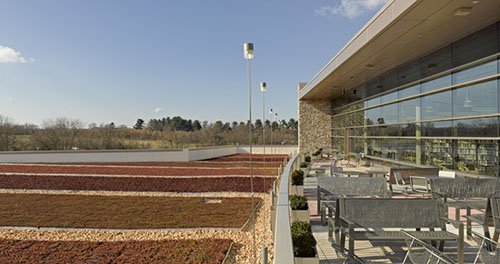
Charles E. Miller Branch & Historical Center
Gipe Associates, Inc. provided mechanical, electrical and plumbing
engineering services including design of HVAC, plumbing, lighting,
power, life safety, site lighting and incoming electric and gas systems
associated with the construction of a new 63,000 SF Library located
off Frederick Road in Ellicott City, Maryland. The scope of work also
included analysis related to Howard County's goal of achieving a LEED
Silver rating for the building. Work included field investigations,
preparation of design plans and specifications, review of bids, and
construction administration for the MEP portion of the project. Feasibility
studies were also included as a part of this contract. The studies
included Savage and Elkridge Branch Libraries.
The energy efficiency of the building is based on current
hours of operation, the building envelope factors, the designed lighting
system, equipment shop drawings, and system design. Basically, all
are known factors that are imported into the Energy Modeling Software.
The only variable which is unknown and assumed is the diversity of
occupants on an hour-by-hour basis throughout the year and/or internal
heat loads associated with receptacles (i.e., computer usage/left on
at night).
Energy consumption varies from building type to building
type as the building function and Code requirements for ventilation
will vary. Similar building types (libraries, schools, office buildings,
etc.) with similar internal heat loads and hours of operation will
have similar energy consumption with differences based on the actual
building design including the efficiency of the mechanical system.
Miller Branch, from its conception, was intended to be
a very efficient building and represents a holistic approach to maximize
its coefficient of performance.
From a building envelope, the building orientation, thermal
mass and cubic nature of the building minimizes surface area. The minimal
envelope area coupled with high “R” factors, solar reflective materials,
light shelves and high performance glazing significantly reduce the
need to consume energy needed to offset these heat gains and heat losses.
Heavy thermal mass associated with dense siding materials (stone, brick,
etc.) additionally reduce energy usage by delaying peak cooling requirements
from ambient outdoor conditions. Similarly, it decreases the energy
loss during the heating season by storing energy in these wall materials.